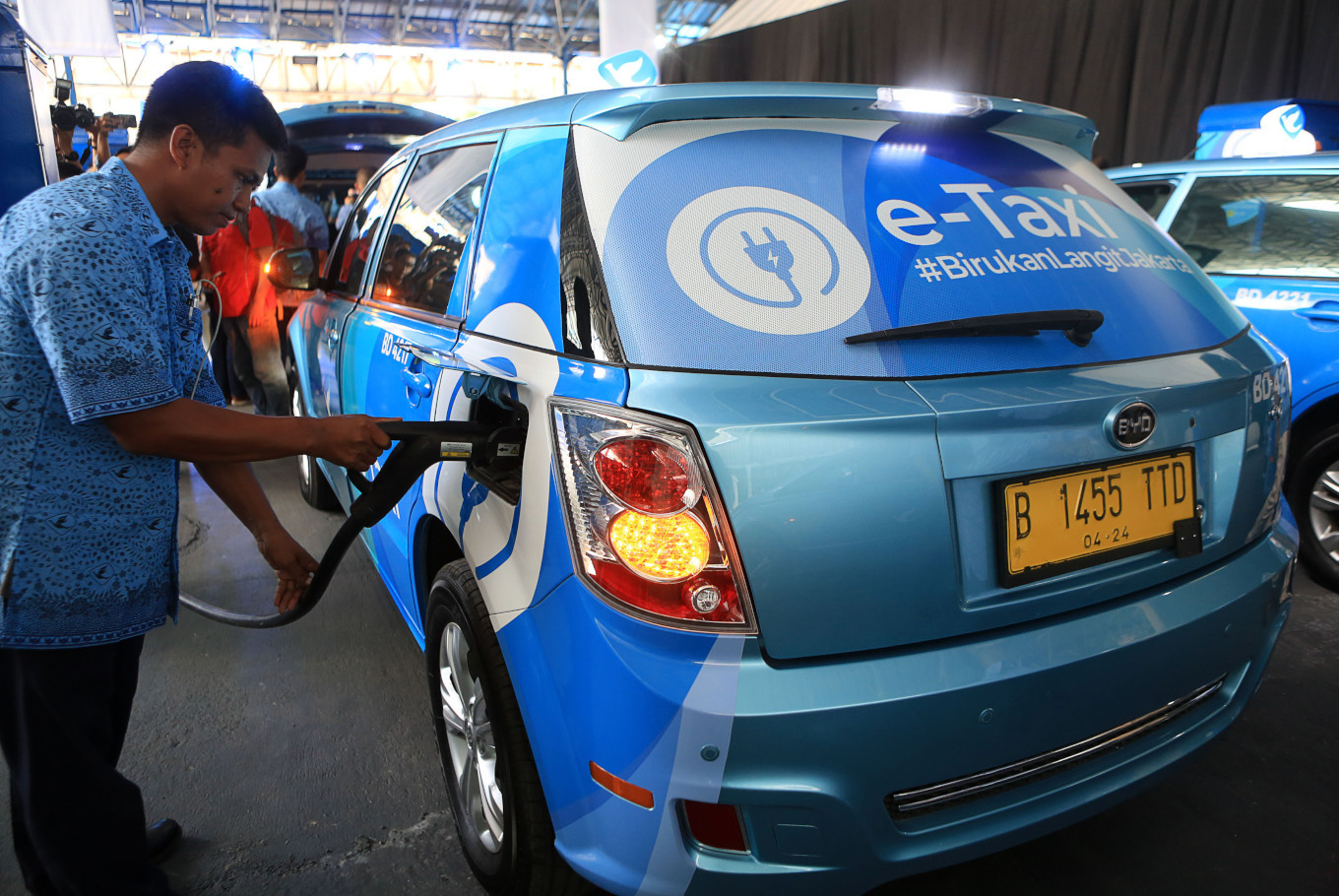Popular Reads
Top Results
Can't find what you're looking for?
View all search resultsPopular Reads
Top Results
Can't find what you're looking for?
View all search resultsState holding to be RI’s battering ram into global battery market
Change text size
Gift Premium Articles
to Anyone
I
ndonesia has mobilized three of its biggest state-owned enterprises (SOEs) and opened talks with two foreign multinationals to bring Southeast Asia’s largest economy into the world’s highly lucrative electric vehicle (EV) battery market.
The SOEs Ministry has ordered mining holding MIND ID, oil and gas giant Pertamina and electricity monopoly PLN to establish a holding company – tentatively called “PT Indonesia Battery Holding” – that will develop an end-to-end domestic supply chain for EV batteries. The trio are also in talks with China’s CATL and South Korea’s LG Chem, the world’s top two EV battery makers by output, to invest between US$12 billion and $20 billion in developing the dream supply chain.
PT Indonesia Battery Holding aimed to produce between 8 and 10 gigawatt hours (GWh) worth of batteries each year, starting around two to three years from now, said MIND ID president director Orias Petrus Moedak during an online press briefing on Thursday.
“The SOEs minister expects the EVs to also be built domestically but, of course, if we produce more batteries than needed, then the logical step is to export [the excess output],” he said.
Fulfilling such an expectation will be challenging as experts have said Indonesia’s EV industry is being held back by limited infrastructure and high capital costs. Nevertheless, the holding company establishment reflects the sheer magnitude of Indonesia’s “massive downstreaming” ambitions – to use President Joko "Jokowi" Widodo’s words – to turn the country from a commodity-driven economy into an industrial economy. To that end, the government banned all nickel ore exports starting last year and plans to ban all metal ore exports starting 2022, thereby forcing miners to process the ore domestically.
Indonesia’s EV batteries will not only cater to the EV industry but also to the energy storage industry, both of which are expected to grow exponentially over the decade as major economies double-down on green energy commitments.
According to the holding’s forecast, global battery demand will quadruple over the next seven years to 777 GWh by 2027, almost all of which will go to EVs. A smaller portion will go into energy storage systems for solar-powered buildings, among others uses.
In comparison, Indonesia’s battery demand is expected to grow 30-fold over the same period to 5.9 GWh in 2027, assuming the government successfully pushes EV usage particularly in the new state capital.
“This is a breath of fresh air. The efforts of Indonesia, with its abundance of mineral wealth, to downstream industries has been met with a good response from foreign investors,” said SOEs Minister Erick Thohir in a joint statement on Wednesday.
As the world’s top nickel ore producer, Indonesia will focus on developing two nickel-based battery blends: nickel manganese cobalt (NMC) and lithium cobalt nickel aluminum (NCA). The two are among the main five blends vying for the EV battery market.
Such nickel-based blends will likely come to dominate the EV market owing to their good performance and low content of cobalt, which is an increasingly expensive metal due to supply constraints, writes consultancy McKinsey & Company in a 2017 report.
“This shift is not certain as battery technologies continue to rapidly evolve, but it is clear the chemistries that emerge dominant will be heavily influenced by potential raw material constraints,” reads the report.
MIND ID, which is in charge of the upstream supply chain, has several multi-million dollar downstream projects in the pipeline, including a $3 billion integrated nickel smelter to be built in either North Maluku or Southeast Sulawesi.
The integrated smelter features a high-pressure acid leaching (HPAL) facility that produces 50 kilotons of high purity battery-grade nickel each year. The smelter also produces a lower purity steel-grade nickel.
MIND ID’s Orias said the company was also looking at ways to secure refined cobalt and manganese domestically. Indonesia has reserves of both metals but is not a major global producer.
“The metal that we really don’t have is lithium,” he said, adding that the miner planned to either acquire lithium mines abroad or import lithium.
Meanwhile, Pertamina, which is in charge of the midstream supply chain, has been assigned to develop a battery cell and battery pack manufacturing plant.
“This will strengthen our position as an energy provider and enable us to capture global EV battery demand,” said Pertamina spokeswoman Fajriyah Usman on Tuesday.
PLN, which is in charge of the downstream supply chain, has been assigned to focus on developing and installing ready-to-use battery sets, which will mainly cater to solar-powered buildings and remote Indonesian villages.
“We’re collaborating with other related institutions, including automakers in Indonesia, particularly on the issue of preparing charging stations,” said PLN president director Zulkifli Zaini in the joint statement. PLN previously calculated that Indonesia needed 31,000 EV charging stations by 2030 to meet its EV goals.










